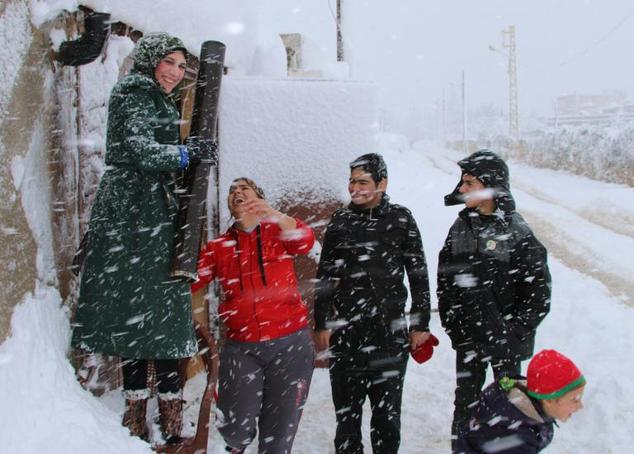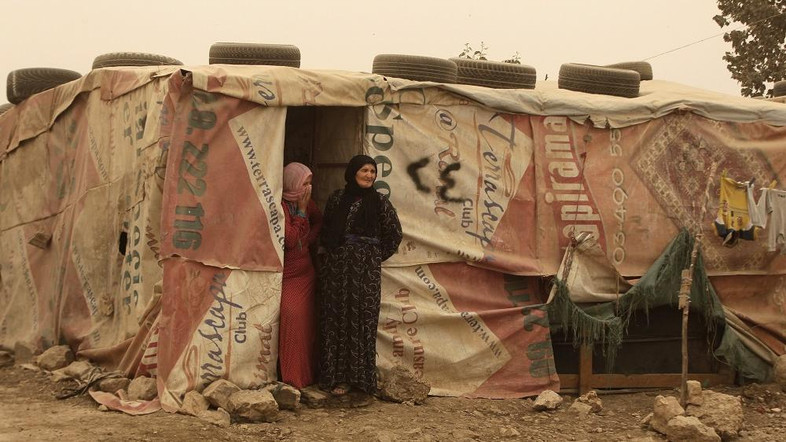
Khadil Ahmad is not really concerned about the 40-degree heat she and her family suffer inside the tent in which they live. Nor the sandstorm that earlier this month swept over Lebanon’s Bekaa Valley. What this Syrian refugee with six children fears the most is the oncoming winter, and the lack of means to deal with it.
“Last year we suffered a lot, had a metre of snow and… then had to deal with constant flooding,” she says over a cup of coffee in the informal camp where her family settled after escaping the war in Syria. They are one of the sixty-four Syrian families that rent a plot of land in the town of Zahle.
In this area, temperatures can drop to minus 10 degrees Celsius when winter storms rage. To keep the little heat released by burning wood in the stove, they cover the thin roof with a second nylon layer.
As with many other Syrian refugees, Ahmad’s family lack many of the most basic needs. Many Syrians in Lebanon are employed in the construction industry or agricultural fields, and wages are very low. Khadil says she barely has money for food. The improvement of their living conditions depend on the amount of aid received from NGOs and U.N. agencies.
Lack of funds
While the Syrian refugee crisis deepens, there is a growing lack of funds to help them. Four months before the end the year, the United Nations program set to respond to the refugee crisis in the region has collected just 37 percent of its multibillion-dollar appeal from its donors, which include states, organizations and individuals.
This aid plan, known as 3RP – Regional Refugee and Resilience Plan – is the response coordinated by U.N. agencies and NGOs to assist more than four million Syrian refugees living in the region. As the European Union debates how many refugees its member states can absorb, five countries currently host 95 percent of Syrians registered at the United Nations High Commissioner for Refugees (UNHCR). Tens of thousands more have chosen not to register or have not been able to do so.
The magnitude of the crisis demands more funds every year. The 3RP forecasted $5.5 billion for 2015 alone, around 50% more than the previous year. Of that, $4.5 billion is from donations through different United Nations agencies and the remaining money flows through bilateral agreements with the governments of Turkey, Egypt, Jordan, Lebanon and Iraq. António Guterres, chief of the UNHCR, warned in early summer that so much money was missing that “we are failing the basic needs of people”.
Less money for food
A sign of this shortage is the cuts in the vouchers distributed by the World Food Programme (WFP). The value of those vouchers has plummeted and the number of beneficiaries has decreased dramatically. Beginning in September, Syrian beneficiaries in Lebanon will get $13.50 per month, less than half the $30 they received in 2014. In Jordan, the reduction is even greater: the value of the vouchers is around 70% less than last year.
“We lack so much money that we have to decide… to whom we deliver vouchers, and now we are selecting only the most vulnerable among the vulnerable,” explains Edward Johnson, external relations at the WFP in Lebanon. Reserves for Lebanon will be exhausted at the end of December and then “we don’t know what we will do,” he added.
Immediate impact

The effects of these cuts are immediate. Ali Khalef has to feed ten of his twelve children, having left Aleppo with his family two years ago, and settled in the town of Bar Elias, near Zahle.
Each day, he rides his motorcycle loaded with clothes that he sells at informal settlements or directly at houses. From the $400 he earns monthly, half of it serves to pay the rent of his two-room apartment.
“I just got a SMS that said vouchers were cut and half of my children will stop receiving them,” explains Khalef, 46. He also benefits from other help: clothes for the winter, heating fuel and some school equipment.
But with not enough means, his older son, 15, will soon leave school in order to get a work.
Encouraging migration
There are more than a million Syrian refugees in Lebanon, in addition to those who haven’t registered. According to U.N. estimates, one out of four people in Lebanon is Syrian. In an attempt to deflect future refugees to other countries, the Lebanese government earlier this year ordered UNHCR to stop registering new refugees. This decision has left thousands of Syrians without help.
Some of the refugees would prefer to leave the country, but they do not have the means.
“I don’t want my children to stay in Lebanon, life here is difficult,” explains Ali Khalef, wishing that his children “could go to Germany to study or just to have a dignified life”.
The shortage of help both aggravates the harsh conditions in which refugees live and increases their desire to go to Europe.
The magnitude of the Syrian conflict – the leading cause of “the worst refugee crisis since the Second World War,” according to UNHCR – is so great that humanitarian aid agencies were not prepared. “At the beginning it was very difficult, but NGOs have improved their response after four years of continuous work,” says Rabab Hakim, Education Coordinator for Terre des Hommes Italy, an international children’s rights charitable organization.
The organization works mostly in the education sector. More than half of the refugees are children, so education is a top priority. Even so, the lack of funding has dramatic consequences.
More than 750,000 Syrian refugee children in school age did not attend school last year.
Khadil Ahmad’s three sons are between 10 and 12 years old. They are all working in Bekaa’s fields. They barely earn five dollars per day, but it is vital money. The father is sick, does not have access to the most basic healthcare and cannot work. “Of course I would like to see my children in school, as in Syria before,” says a resigned Khadil.
School drop-outs
The problem is not limited to school tuition fees. In Lebanon, many children can’t walk to school, so they have to take buses. In a country where there is a deficient public transport system, the monthly cost for a refugee child go to school ranges “between 20 and 50 dollars […] a big spend for families,” says one aid worker in Lebanon.
The first voucher cuts at the end of last year had an impact on the drop-out statistics. A study of the 3RP plan published in June detailed that 14 percent of Syrian families with school-age children in Lebanon had withdrawn them from school to help cope with reductions in food aid, “forcing them to work or beg”.
Another employee in the sector, who prefers to remain anonymous, asks rhetorically: “Why would kids study if families can barely feed them?”
The response to the crisis has added some notable successes. Around 21 million people have been vaccinated against polio and more than 1.5 million refugees have access to primary healthcare. But the lack of funds in a crisis that has no end in sight is such that the long-term consequences may be severe.
The 3RP study warns that if the call for action “remains unheard”, a generation of Syrians will be left “behind”. It concludes saying that regional countries are carrying a burden that “they cannot and should not bear alone”.
Al Arabiya
We at Ya Libnan encourage and welcome an open exchange of ideas on this story’s topic, but we kindly ask all participants to follow our guidelines for respecting community standards. Personal attacks, inappropriate language, and off-topic comments may be removed, and comment privileges revoked .

Leave a Reply
You must be logged in to post a comment.